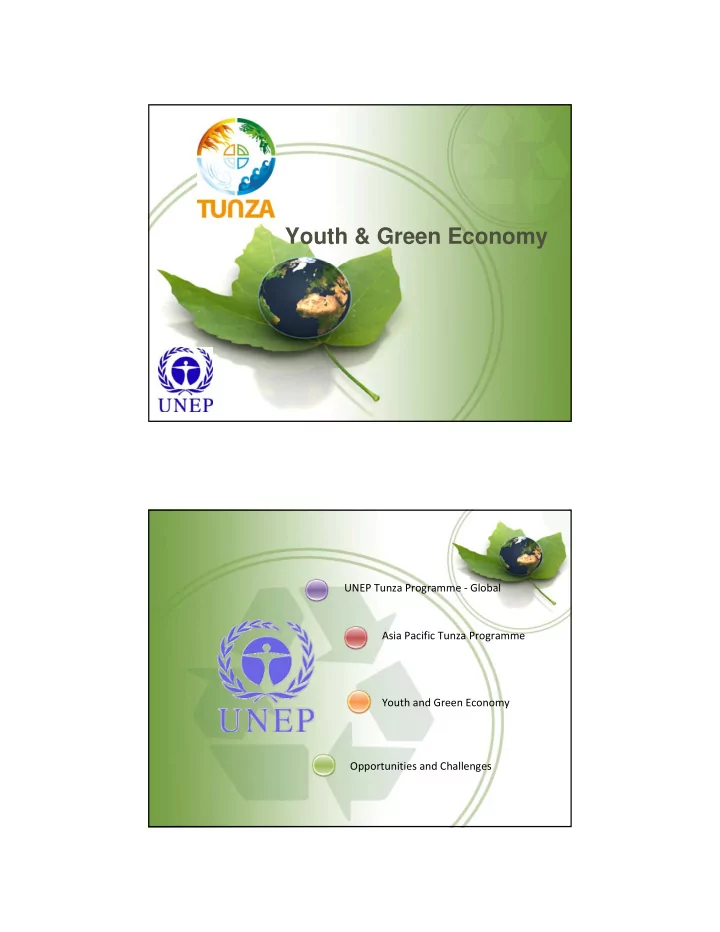

Youth & Green Economy UNEP Tunza Programme ‐ Global Asia Pacific Tunza Programme Youth and Green Economy Opportunities and Challenges
Global Tunza Programme EMPOWERMENT • Participate - young people participate in environmental issues • Voice - participation in high-level meetings Action • - enhance, inspire and enable the involvement of children and young people in sustainable development Global Tunza Programme Children and Children and International International Youth Youth Children and Children’s Youth Painting Conference Tunza Competition Tunza Youth Youth Junior Junior Advisory Young Advisory Board International Board Environmental Council Council Children’s Envoy Conference Tunza Magazine N. AMERICA AFRICA ASIA EUROPE WEST ASIA
Tunza Asia Pacific • South Asia Youth Environment Network • North East Asia Youth Environment Network • South East Asia Youth Environment Network • Central Asia Youth Environment Network • Pacific Youth Environment Network Asia Pacific Tunza Network Global Network CAYEN NEAYEN PYEN SEAYEN SAYEN Australia Cook Island Brunei Fiji Cambodia Afghanistan Kiribati Kazakhstan China Indonesia Bangladesh Marshall Islands Kyrgyzstan Japan Laos Bhutan Nauru Tajikistan Mongolia Malaysia India Niue Turkmenistan Republic of Myanmar Maldives Samoa Uzbekistan Korea Philippines Nepal Solomon Is. Tokelau Singapore Pakistan Tonga Thailand Sri Lanka Tuvalu Vietnam Vanuatu
Challenges • Nearly 40 per cent of the world’s 211 million unemployed people – more than 80 million – are aged 15-24. • In developed countries, one in four of the long-term unemployed are youths. • Limited connection with industry • Marginal in decision making Opportunities • Potential for Jobs - In 2006, more than 2.3 million people worldwide were working in the renewable energy sector - The recycling industry in Brazil, China and the USA alone employs at least 12 million people. - Processing recyclable materials sustains 10 times more jobs than landfill or incineration (on a per tonne basis) • Potential for Training in Different Sectors - Waste management and recycling employ more than 500,000 people in Brazil. - Ecotourism has a 20 per cent annual growth rate, about six times the rate for the rest of the sector. Travel and tourism employ 230 million - Emerging economies’ share of global investment in renewables rose from 29 per cent in 2007 to 40 per cent in 2008 – primarily in Brazil, China and India. - Only 25 per cent of the world’s waste is recovered or recycled. The world market for waste is worth around $410 billion a year.
Opportunities and Challenges •Consumers and - Source of Lifestyle Change Innovation of Green •Think outside the Lifestyles box - Impulse for •Interconnected transition to worldwide and Green linked to each other Economy •Linked to CSOs and public organizations •Industry – training, sponsorship, employment Challenges and Opportunities • Engage them in research and data • Networked - to schools, universities, public, private organizations • Using new tools to tap into this connectivity
Conclusion • Social Enterprise • Fundraising • Exchange Programmes • Best practices • Tools and Guidelines • Small Project Funds • Competitions – blog, • Social network – Generation of Twitter Warriors and Facebook Ninjas United Nations Environment Programme www.unep.org/roap Children and Youth: www.unep.org/roap www.unep.org/tunza THANK YOU
Recommend
More recommend